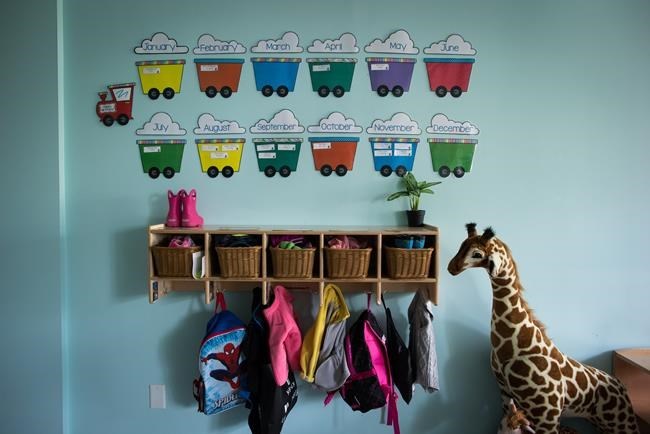
Children's backpacks and shoes are seen at a daycare, in Langley, B.C., on Tuesday May 29, 2018. Experts in education say many young students are facing problems getting back into the swing of school after the COVID-19 pandemic forced most of them to learn from their own homes. THE CANADIAN PRESS/Darryl Dyck
October 25, 2021 - 1:00 AM
The first day of school was a nightmare for Maria Camden's seven-year-old daughter Aubrey, ending in an anxiety attack behind her Paw Patrol mask.
Camden and her two daughters moved from Coquitlam, B.C., to Toronto over the summer, and while 10-year-old Baileigh looked forward to meeting new friends after several months of online learning, the flood of changes was more difficult for Aubrey.
Six weeks into the new school year, Camden said Aubrey is doing better settling into a routine. But some days are still challenging for both girls.
"Overall it's been a struggle — even things like getting the kids up in time," Camden said. "It's the change they've had to endure and they're making it work, but it's been hard."
Nikki Martyn, head of the early childhood studies program at the University of Guelph-Humber, said many young students are facing problems getting back into the swing of school after the COVID-19 pandemic forced them to learn from home, where parents were nearby and rigid schedules were often replaced with loosely structured days.
Martyn said older students with more in-person experience are generally doing better than many in kindergarten or Grade 1, whose academic career until September largely took place at the dining room table, in front of a computer screen.
While some children have fallen behind in math and reading, Martyn said teachers and parents are more concerned with those who appear to lag in social and emotional development.
"When we look at our littlest guys, they haven't had that time to learn to share, to control emotions and all of those really important social pieces," she said. "We've all adapted to home and parents were always around and (kids) didn't get that sense of independence, that opportunity to push themselves a little bit."
Martyn said most kids can catch up academically, and suggested pandemic hobbies may have sharpened other skills — those who turned to books during lockdown improved their reading while others who spent time playing video games might have honed fine motor skills.
Sarah Barrett, an education researcher and associate professor at York University, said the pandemic also taught some kids how to be adaptable. As schools shifted from in-person to online — and back and forth again — kids learned flexibility and empathy, she said: "The pandemic made it possible to understand that the whole world was going through something."
Barrett, who published a study on equity in online classrooms during the pandemic in March, recently reached out to the same 50 Ontario teachers she interviewed for that previous research to ask how students are adjusting to in-person learning.
Respondents mostly taught younger grades, though teachers of kindergarten to Grade 12 were represented. Barrett said the general consensus was that kids were "glad to be back, face-to-face with their friends."
Because teachers are used to addressing the annual summer slide, she said many aren't concerned by lags in reading or writing. But they do worry about students' mental health.
"Across the board, K to 12, students are recovering emotionally and they display that in different ways," Barrett said. "There's a level of anxiety for them that if they're faced with a difficult situation academically, it's harder to keep trying because mentally they're still recovering."
Not all students are finding the adjustment challenging, however. Winnipeg mom Brenda Marion-Gerula said her four kids, aged 10-13, are thriving since returning to in-person learning.
The transition was eased by keeping her kids in the same school-day routine they had when learning online, including waking up at the same time instead of rolling out of bed minutes before class started.
While Marion-Gerula said she was concerned her children would develop "a bit of a learning gap" when school shifted online in March 2020, she praised their teachers for adapting.
"They all had to learn a different way of (teaching)," she said. "I mean, they did a good job considering what they had to go through."
Experts said returning to school has been tough on some teachers, especially those who've had to shift lesson plans from in-person to virtual with little notice. A COVID-19 outbreak at a Toronto middle school last week forced students back online temporarily, while another city high school recently re-opened after reporting 11 cases earlier this month.
Teachers of younger grades are also dealing with groups at different levels of social and academic development, which further complicates lesson planning, Martyn said.
"There's responsibility on teachers to respond to individual needs, to meet the child where they're at, to create an environment for children and learn and grow and flourish, and that becomes different now than before the pandemic," she said.
"It has a toll on teachers and it's really important to be aware of burnout. When teachers are burnt out, they're not able to be as attentive, as empathetic. And it's not for lack of effort."
Martyn said the lags students are experiencing in social or academic development could last years for some, but parents and teachers can help by "understanding, empathizing and connecting with our kids to give them the best possible outcome."
Barrett said kids are resilient and can bounce back, as long as adults give them "time and tools to do that."
"The worst thing you can do is say, 'OK, take a year to get caught up and we're right back to where we were before,'" she said. "We have to respond to where students are and the situation they're in and move forward that way."
This report by The Canadian Press was first published Oct. 25, 2021.
News from © The Canadian Press, 2021